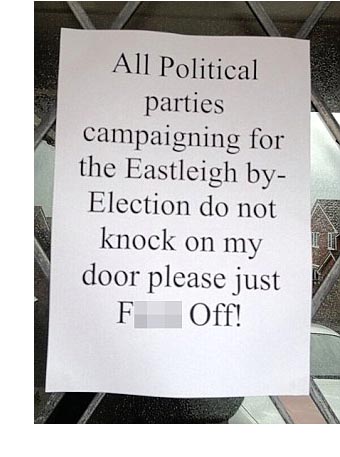 The post mortems over Eastleigh continue to multiply, leading Raedwald to offer half a cheer at Charles Moore'ssudden realisation that "all parties are the same".
The post mortems over Eastleigh continue to multiply, leading Raedwald to offer half a cheer at Charles Moore'ssudden realisation that "all parties are the same".This, in fact, is the dominant theme in many of the comments to the Tory Diary, while the editorial staff remain locked in their intellectual bubble, unable to comprehend what the rest of the world is telling them.
If they begun to understand the "all parties are the same" meme, they would immediately realise that their call to arms cannot succeed. At the moment, the main attack on the UKIP tendency is to point out that "robbing" the Conservatives of a vote simply lets in Labour or – in the case of Eastleigh – the Liberal Democrats.
Arguably – and with some justice – the effect of UKIP's intervention in this most recent of by-elections has been to open the gate for Mr Clegg's europhile candidate, excluding an ostensibly eurosceptic Maria Hutchings, who could have strengthened the anti-EU ranks of the Tory parliamentary party.
But the logic of the situation is unassailable. Just as with the eurosceptic Owen Paterson in post as environment secretary, we are still bound by EU law, so the election of Hutchins to the green benches, instead of a Lib-Dem, would make absolutely no difference.
Hence, it is not so much that all parties are the same – per se. Manifestly, they are not. One has just to look at Owen Paterson and then Mary Creagh to realise that between the Conservatives and Labour, there is a massive ideological gulf. But the point is, whether it was Paterson or Creagh at the despatch box, nothing fundamental change as long as the UK is a member of the European Union.
What seems to be happening, though, is that this political philosophy – or anti-philosophy – is becoming strengthened by the antagonism towards the established political parties, so that UKIP is also becoming a reservoir for the protest votes, taking over the role from the official opposition and what was once the Liberal Party.
The irony here is that, in order to harvest votes from the establishment parties, UKIP too is becoming an establishment party. To be accepted by the media and the political classes – and indeed the electorate – it must ape the very constructs it is supposedly challenging. Rather than taking on the establishment, Nigel Farage becomes part of it.
Thus, if UKIP supporters, both temporary and longer-term, are looking for something different, they are most likely going to be disappointed. In the unlikely event that Mr Farage is ever in a position to control the British government, it would be on the basis of a compromise with political allies, which could include him ditching his party's ambition to leave the EU.
But, if Farage did lead the nation out of the EU, this would not necessarily change anything on the ground. To ordinary people robbed of power, it makes little difference whether laws are made in Brussels or Whitehall. The geographical location of those who wield power over the powerless is of academic interest only.
What Farage offers, therefore, is not the promise of democracy – for power is what democracy is all about – but the prospect of change, without anything fundamental being specified.
To that extent, what we have in Farage and his party is a British version of Beppe Grillo and his Five Star Movement (M5S) in Italy. Grillo himself has always claimed that Italy's politicians are all the same, but analysts now argue that, "despite its radical appearance and its revolutionary rhetoric, we believe that, over the past three years, the M5S has effectively defended the present system, acting as a force that has quelled rebellion and stabilised the system".
As with M5S and to an extent also Geert Wilders' party in the Netherlands, we see in UKIP a lightning conductor. Of Grillo and his partner in crime, Gianroberto Casaleggio, it is said that they have intercepted the "indignation" expressed by ordinary people at the dereliction of their government and, on the back of this have created a political/economic franchise with its own copyright and trademark, a movement rigidly controlled and mobilised from the top.
It is also said of them that they have hijacked slogans and ideas from social movements and mixing them with apologies for an "ethical" capitalism, with superficial statements centred on the honesty of the individual/politician/administrator. Thus have they:
… created a confused set of proposals, where neoliberal and anti-capitalist, centralist and federalist, libertarian and reactionary could co-exist. A manifesto for all occasions, cherry-picking ideas wherever they found them and whenever they considered them useful, typical of a diversionary movement.Just as we see Grillo list his demands which amount to nothing more than "tweaks" to the established order, so we see UKIP threatening to wreck the Conservative chances of winning the next election while offering nothing of any great consequence which would alter the balance of power between citizen and state.
Effectively, Farage's idea of change is to put himself and his supporters in power instead of Brussels – swapping one set of bosses for another - a prospect some might find so unattractive that they might actually prefer Brussels.
Either way, the one thing not on offer is any form of government which takes us any closer towards a democratic state, in which event UKIP has much in common with the established parties, which it currently emulates.
Its great, and possibly only difference is that it has not yet tasted power, and has therefore yet to disappoint its followers as it grapples with the compromises need to retain power and see off the competition. And that, when or if it happens, will bring its own disillusionment as people gradually discover that UKIP is just like the rest.
COMMENT: "EASTLEIGH" THREAD